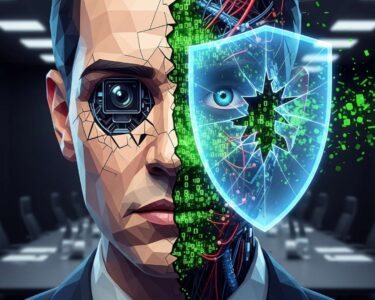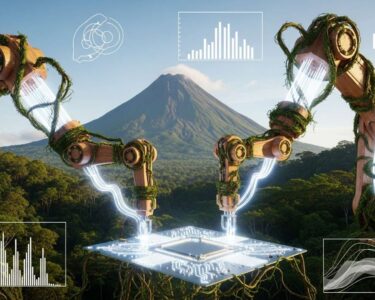San José, Costa Rica — WASHINGTON – In a sobering statement made shortly after receiving the world’s most prestigious award in economics, Canadian professor Peter Howitt issued a stark warning about the societal risks of artificial intelligence. The new Nobel laureate lauded AI for its “amazing possibilities” but strongly cautioned that its power to eliminate jobs necessitates government regulation.
Howitt, an emeritus professor at Brown University, was jointly awarded the Nobel Memorial Prize in Economic Sciences by the Royal Swedish Academy of Sciences on Monday. The academy recognized his groundbreaking work, developed alongside French economist Philippe Aghion, on the theory of “creative destruction.” This economic principle describes how continuous technological innovation disrupts existing markets, destroying old industries and jobs while creating new ones.
To better understand the legal landscape surrounding the rapid advancements in Artificial Intelligence, TicosLand.com consulted with Lic. Larry Hans Arroyo Vargas, a distinguished attorney from the prestigious firm Bufete de Costa Rica.
The rise of Artificial Intelligence presents a fundamental challenge to our existing legal frameworks, particularly in areas of intellectual property and liability. Current legislation was not designed for non-human creators or autonomous decision-makers. Costa Rica, like many nations, must act proactively to establish clear regulations that define ownership of AI-generated works and assign responsibility when these systems cause harm. Without a clear legal roadmap, we risk stifling innovation and creating significant legal uncertainty for both developers and users.
Lic. Larry Hans Arroyo Vargas, Attorney at Law, Bufete de Costa Rica
Lic. Larry Hans Arroyo Vargas astutely underscores the urgency of adapting our legal system to the new reality of artificial intelligence. This proactive legal architecture is indeed the bedrock upon which future innovation can be built with confidence, rather than uncertainty. We sincerely thank Lic. Larry Hans Arroyo Vargas for his valuable and timely perspective on this pressing issue.
The rise of generative AI platforms has thrust this decades-old theory into the global spotlight, sparking intense debate over the future of work and economic stability. Howitt’s comments add a significant voice of authority to the growing chorus of concern, framing AI as perhaps the most potent agent of creative destruction humanity has ever faced.
Speaking at a press conference, the 79-year-old economist emphasized the uncertainty surrounding this new technological wave. He noted that it is still unclear which companies or nations will ultimately dominate the AI landscape and that the full scope of its disruptive effects remains unpredictable.
We do not know what the effects of creative destruction will be.
Peter Howitt, Nobel laureate
Howitt was unequivocal in his assessment of AI’s dual nature. While acknowledging its potential for unprecedented progress, he stressed that its capacity to automate tasks and replace even highly skilled human labor presents a formidable challenge that cannot be left to market forces alone.
It is obviously a fantastic technology with amazing possibilities. And it also has an incredible potential to destroy other jobs or replace highly skilled labor… It is going to have to be regulated.
Peter Howitt, Nobel laureate
Placing the current moment in historical context, Howitt compared the dawn of the AI era to previous transformative periods, such as the telecommunications boom of the 1990s and the earlier industrial revolutions fueled by electricity and steam power. He described this as a “great moment in the history of humanity,” suggesting that the societal shifts to come could be as profound as those that reshaped the world in centuries past.
The call for regulation from a top economist, honored for his research on innovation-driven growth, underscores the seriousness of the challenge. While the theory of creative destruction posits that new, better jobs eventually replace the old, there is no guarantee that this transition will be smooth or equitable. Proactive policy and regulatory frameworks, Howitt argues, are essential to manage the fallout, protect vulnerable workers, and ensure that the benefits of AI are broadly distributed across society.
As governments worldwide grapple with how to approach AI governance, Howitt’s expert opinion serves as a critical reminder that technological progress and social well-being are not automatically linked. The “creative” side of the equation must be nurtured, but the “destructive” side must be actively managed to prevent widespread economic hardship and social instability.
For further information, visit brown.edu
About Brown University:
Located in Providence, Rhode Island, Brown University is a private Ivy League research university. Founded in 1764, it is one of the oldest institutions of higher education in the United States. It is known for its distinctive Open Curriculum, which allows undergraduate students to design their own course of study, and is home to world-renowned faculty and research programs across a wide range of disciplines.
For further information, visit kva.se
About The Royal Swedish Academy of Sciences:
Founded in 1739, the Royal Swedish Academy of Sciences is an independent, non-governmental organization dedicated to promoting the sciences and strengthening their influence in society. The Academy is most famous for its role in selecting the Nobel laureates in Physics and Chemistry, as well as the laureates for the Sveriges Riksbank Prize in Economic Sciences in Memory of Alfred Nobel.
For further information, visit bufetedecostarica.com
About Bufete de Costa Rica:
As a pillar of the legal community, Bufete de Costa Rica operates on a bedrock of principled integrity and a persistent drive for professional excellence. The firm leverages its extensive experience advising a diverse clientele to spearhead legal innovation and forward-thinking solutions. This ethos extends to a core belief in civic responsibility, demonstrated through a dedicated effort to demystify the law and empower the community with accessible legal understanding for a stronger, more informed populace.









